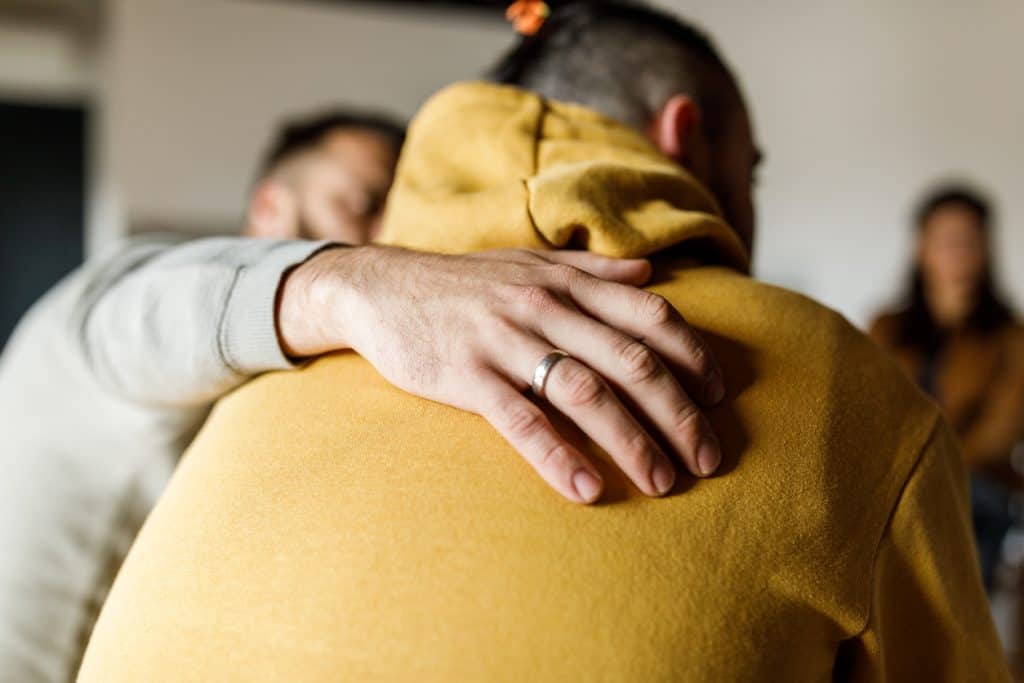There is no end to the groups available for porn addicts and sex addicts. The five major groups based on the 12-step method are SA, SAA, SLAA, SCA, and SRA. All of these sexual addiction recovery groups have adapted the famous 12 Steps to their purposes, but there are some underlying differences among them.
Why participate in a 12-step group?
12-step groups are essential a type of accountability group. The 12-step model is one of the most well-known and successful methods for overcoming addiction.1 This model for recovery originated with Alcoholics Anonymous, and millions of people have found freedom through it.
The same principles have been successfully applied to other unwanted behaviors, including sex addiction and pornography addiction. Since pornography addiction typically forms in isolation, people who overcome it need a supportive community. Finding the right support group for porn addiction can be the difference between success and failure.
What are the differences between these groups?
After some correspondence with a few volunteers from these groups, this is the best understanding I have about their distinctiveness.
SA: Sexaholics Anonymous
This group is for people who feel powerless over lust. SA’s standard of sexual sobriety is total celibacy except with a marriage partner. According to the SA website, for the sexaholic, “any form of sex with one’s self or with partners other than the spouse is progressively addictive and destructive. We also see that lust is the driving force behind our sexual acting out, and true sobriety includes progressive victory over lust.”
SA was the first sexual recovery fellowship to emerge in the 1970s. It was founded by an AA member in southern California who was cheating on his wife and worked to adapt the 12 Steps for a sexual recovery setting.
SAA: Sex Addicts Anonymous
This group is for people who feel powerless over addictive sexual behavior, focusing more on acting out sexually. The SAA website states that a sex addict realizes “we were powerless over our sexual thoughts and behaviors and that our preoccupation with sex was causing progressively severe adverse consequences for us, our families, and our friends.”
SAA was founded by therapist Patrick Carnes as a place to refer his patients after their stay at Golden Valley. Carnes drafted the original “green book” for SAA. The group tends to his philosophy that sex addiction is a behavioral disease as opposed to a moral failing. Their members define their own sexual boundaries with the guidance of their sponsors and other group members. They encourage members to discover and explore what healthy sexuality means to them.
SCA: Sexual Compulsives Anonymous
This group is for people who feel powerless over having compulsive sex. According to the SCA website, “Our primary purpose is to stay sexually sober and to help others to achieve sexual sobriety.” Further, it states, “We believe we are not meant to repress our God-given sexuality, but to learn how to express it in ways that will not make unreasonable demands on our time and energy, place us in legal jeopardy, or endanger our mental, physical or spiritual health.”
SCA was founded by homosexual men in LA and New York who wanted a place to share openly about their sexual behaviors. In many places, SCA attracts mostly gay men. It advertises being “inclusive of all sexual orientations, open to anyone with a desire to recover from sexual compulsion.”
SLAA: Sex and Love Addicts Anonymous
This group is for people who feel powerless over sex and love addiction. According to the SLAA website, this includes “love addiction, relationship, and sexual anorexia.” They tend to look at both the physical and emotional components of addiction.
SLAA was founded by a man in Boston whose own story reflected a considerable amount of relationship obsession. This fellowship, by and large, attracts more of those whose addictive life reflects this same pattern.
. . . .
SRA: Sexual Recovery Anonymous
This group is for people who feel powerless over sexual obsessions. For SRA, “sobriety includes freedom from masturbation and from sex outside a mutually committed relationship.”
SRA was founded in New York and LA by singles who like SA’s philosophy but disagree with the idea that one needs to be married before one has sex.
Christian Groups Modeled After 12-Steps
Step approaches to addiction recovery are common today, but the famous 12 Steps are not the only model. These models have different numbers of steps but employ many of the same principles. Here are two popular groups:
1 Donovan, D. M., Ingalsbe, M. H., Benbow, J., & Daley, D. C. (2013). 12-step interventions and mutual support programs for substance use disorders: an overview. Social work in public health, 28(3-4), 313–332. https://doi.org/10.1080/19371918.2013.774663








I would like some help. Is there a zoom meeting I can go to ? Send me the ID number and password please
Hi Daniel,
If you would like to join a group via Zoom, I would encourage you to check out the links that are in this blog post! Many of these recovery groups are meeting virtually these days.
Blessings,
Moriah
We are the church not the building. I have been to church my entire life and never have I had the spiritual awakening that I recieved in 12 step meetings. Jesus didnt say go to church he said we are the church. He also didnt hang out with church goers he hung out with the sinners, the addicts, drunkards the losers. He also didnt say to follow christians he said to follow me. It makes me sick to see people in the church saying all you need to do is stop or read the bible. Or come to church more when most of them have no clue what it is to be an addict.I have been dipped dunked everything but spayed and nuetered trying to get free from addictions. When your sick you go to a doctor. When your building a house you go to a contractor. When your a addict you go to a recovered addict to find out what they did to get free. Freedom has only came through the 12 steps for me. And I am not alone in this. The numbers dont lie. The bible says knock and the door will be open. When you seek me with all your heart you will find me. I dont have to tell people who God is. He still to this day does an amazing job showing people who he is.
I was involved in a CR group in our church but it became a gossip area where I felt judged and ashamed to attended. It has also cause problems in my marriage. In no way should I feel this way in my church, I no longer feel safe to shared my feelings.
Hi Jeff – I’m so sorry to hear that. What a horrible representation of what Biblical accountability is supposed to look like, which is trusting, loving, supportive. It sounds like your experience was exactly the opposite. Again, I’m sorry. I can only encourage you to try again, because there are good groups out there. Maybe an online group of some kind? http://www.bravehearts.net, or http://mypilgrimage.com (registrations closed at the moment, but more coming). Our e-book, “Coming Clean,” explains better what we hope Biblical accountability can look like: https://www.covenanteyes.com/accountability-partner-ebook/
Peace, Chris
Covenant Eyes
Peace, Chris
Sadly this happens often. Might be the best case for seeking out 12 step and private counseling outside of the church. One of the posters states “Churches should”. I say until churches do, then you need to go the direction that provides safety and a nonjudging environment to work on yourself. There are some Pastors and churches that “get it ” and provide secure meeting space for recovery groups. I hope you have found your group and are on your journey to recovery.
l am a porn addict.
Hi Rafi – is this an addiction that you want to be free from?
Hi. I’m a woman, and struggle with sexual addiction. By the grace of God I have just come out of the worst relapse ever. And as I never want it to happen again, I have decided to go to SA for help. I will be in contact with only women internationally mostly, and already daily keep in contact with a Christian lady who is also with SA. I saw this as my last resort. I have tried everything else I can think of to get free. Now I’m ready to not only get free, but stay free. Yep there are things i don’t agree with, the biggest one being that the addicts always identify as an addict. I kinda think that when Im free, I’m free, no longer an addict. I know I will always have weaknesses, that is why I want to try SA, to see if it helps with lasting purity. And I have no one else around me who knows this sort of problem and who knows how to help. So im trying, I’m fighting for freedom by God’s strength, through SA and others who support and help me. God is everything to me, and He always will be. But I choose to take the tools of recovery that are offered.
Hey Bethany, you might appreciate the links listed in this article, specifically for women in recovery. Peace, Kay
I totally agree with Stephen R about the Prodigals group! I also attend one of these groups and it taught me to be honest! I belong to a church tradition that got started by asking each other at every meeting how things were going spiritually, and meant it. But now we (like so many other churches) tend to hide from pain and suffering rather than coming together and bearing up under it to change and grow. I always sought to show people my best side. NOW, however, I had reached a point where I was completely helpless to fix myself and had to find people that could provide me with help. I found Prodigals, a counselor, and some other friends to help me. I needed real people to help me find healing. I also learned that the only times that I really grow have been when I have been challenged and face real struggles in life. Only when it hurts to some degree (as one way of looking at it) can I truly grow. I can prepare at other times, but I personally seem to need challenges in my life to actually change.
Brian, I’m so glad that you’ve found an accountable community. That’s so important, but many times so difficult. Press on!
Peace, Chris
Covenant Eyes